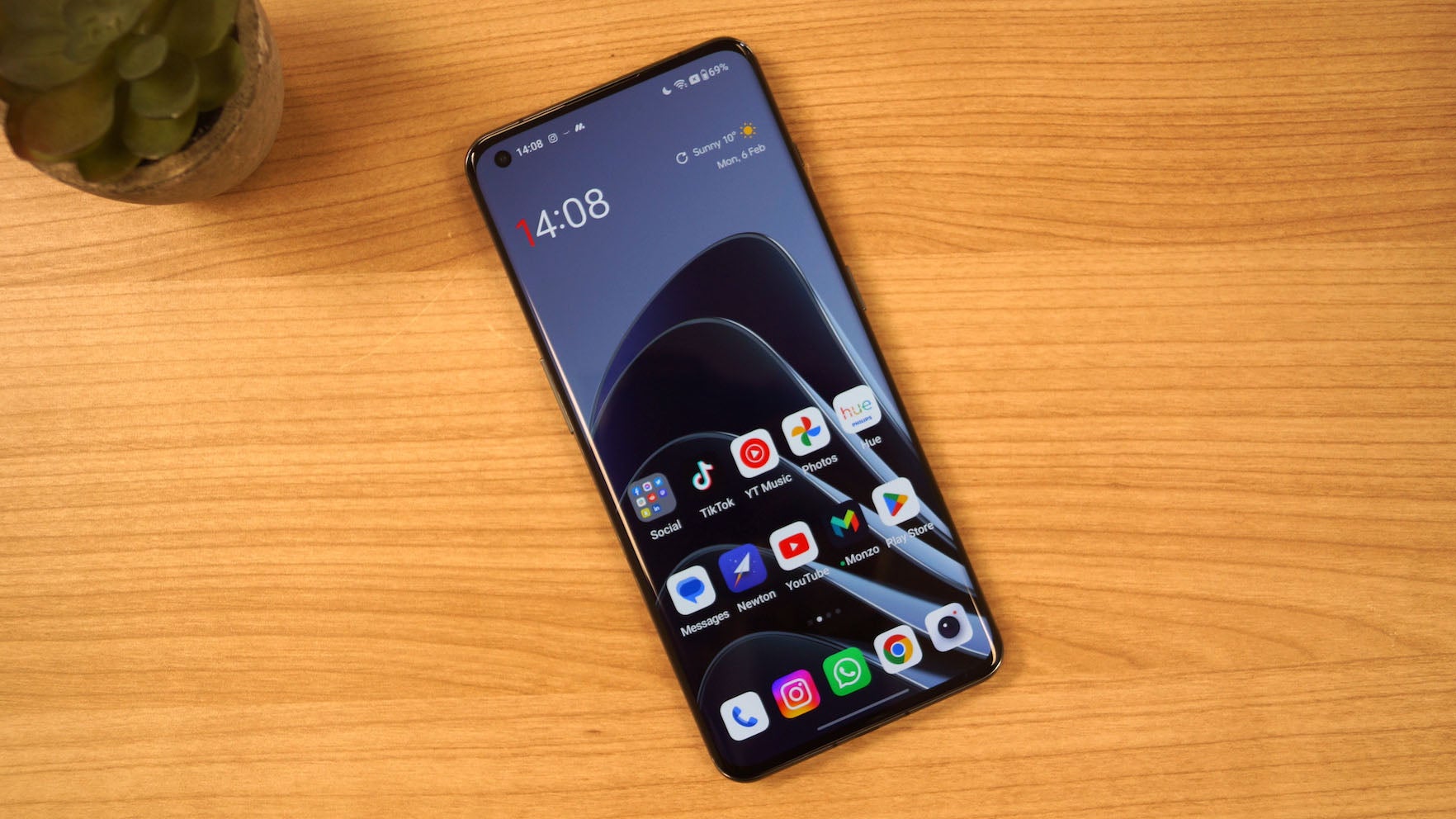Verdict
The OnePlus 11 looks to be a great all-rounder, hitting most criteria for what a flagship smartphone should offer. It looks great, boasts a gorgeous display, high-end performance, all-day battery life and, crucially, impressive camera chops with no immediate pitfalls. Sure, there are small omissions like wireless charging, but for the most part, the OnePlus 11 is a tempting option in the 2023 market.
Pros
- Stunning 6.7in AMOLED display
- Solid flagship performance
- Great rear camera performance
- All-day battery life
Cons
- No wireless charging
- Basic selfie camera setup
Availability
- UKRRP: £729
- USARRP: $699
- EuropeRRP: €849
- CanadaTBC
- AustraliaTBC
Key Features
-
Top-end displayThe 6.7in AMOLED display is one of the best around with a 120Hz refresh rate, support for Dolby Vision HDR and LTPO 3.0 technology. -
Capable rear-camera setupThe 50MP main camera is capable in both well-lit and low-light environments. The 48MP ultra-wide and 23MP telephoto lenses further improve the experience on offer. -
Top-end performanceWith Qualcomm’s Snapdragon 8 Gen 2 chipset, expect top-level performance no matter what you’re up to.
Introduction
After a China-focused launch in early January, the OnePlus 11 has had its worldwide debut.
The OnePlus 11 looks to fix some of the big complaints with last year’s smartphone offering with both improved camera performance compared to the OnePlus 10 Pro and the super-fast 100W charging exclusive to the OnePlus 10T last summer.
The question is, is it the 2023 flagship you should spend your hard-earned cash on? I’ve spent the last few weeks using the OnePlus 11 as my daily smartphone and I think the answer is a resounding yes.
Design and screen
- New circular camera housing on the rear
- Great build quality
- Top-end 6.7in AMOLED display with LTPO 3.0
The OnePlus 11 has undergone a bit of a facelift compared to its predecessor. It still retains the identity of a OnePlus smartphone, but has undergone refinements and enhancements.
It’s a well-built combination of aluminium and glass with a new stainless steel camera housing on the rear that looks a little bit like the Samsung Galaxy S22’s contoured camera housing, though this one is circular.
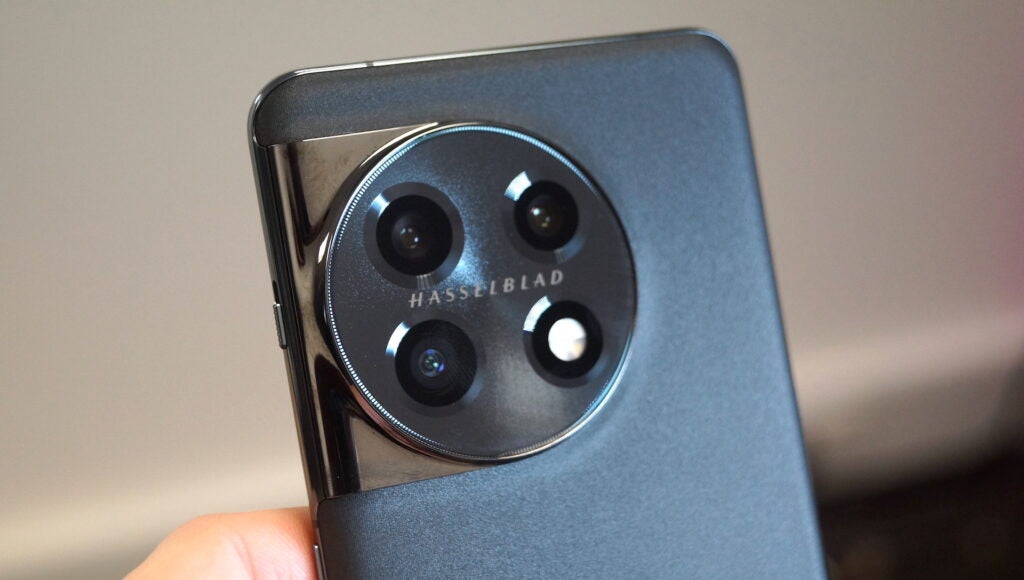
OnePlus says it’s inspired by a black hole and while that’s almost certainly marketing guff, the sparkly effect within the housing does look rather unique and eye-catching. It also helps that it matches the slight sparkle of the rest of the rear – as long as you opt for the black finish, that is. There’s also a more refrained green finish if you don’t like the eye-catching posterior of the black variant.
Long-time fans lamented the loss of the Alert Slider in last year’s OnePlus 10T as it was one of the key features of the OnePlus brand since the early days, giving users the ability to quickly set their phone to loud, vibrate or silent with the flip of a switch. But, true to OnePlus’ word, it’s back with the OnePlus 11, located on the top-left side of the phone.
It’s one of the most convenient features of any smartphone that gives you a way to visually check which sound mode the phone is on without having to wake the phone and access the notification shade. It’s a wonder that it’s only OnePlus and Apple that utilise the tech.
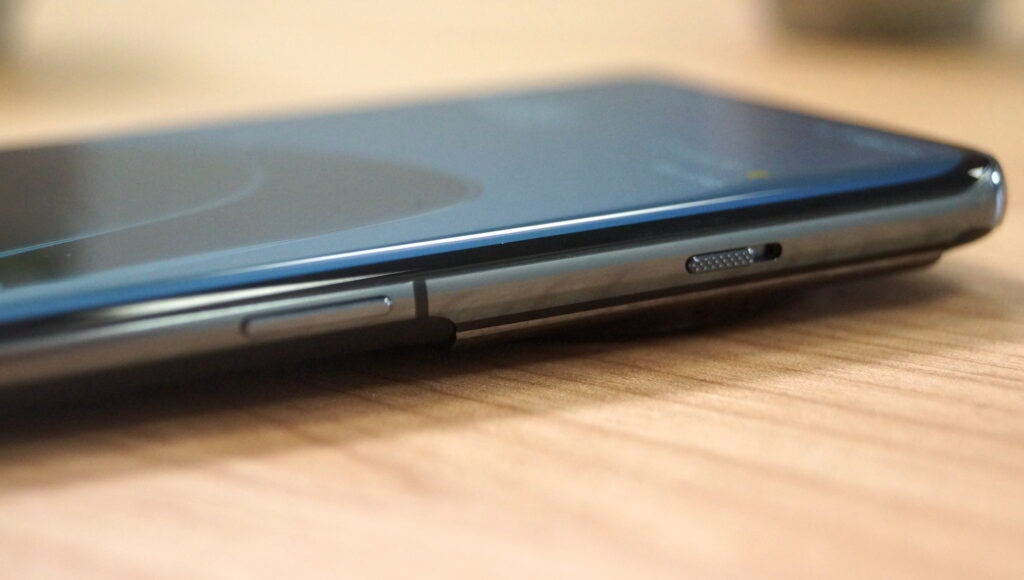
The 6.7-inch AMOLED display is one of the highlights of the phone, packing truly premium tech including a 2K resolution, 120Hz refresh rate and LTPO 3.0 tech that allows it to dynamically drop down to as little as 1Hz to save battery life when high refresh rates aren’t needed (like with the always-on display).
That’s a pretty important step as the always-on display is particularly useful, displaying not only notifications and the time but the ability to control music – as long as you use Spotify, that is – via the always-on display. The company suggests it can also display takeaway order updates, but this feature is not yet supported by any delivery apps in the UK.
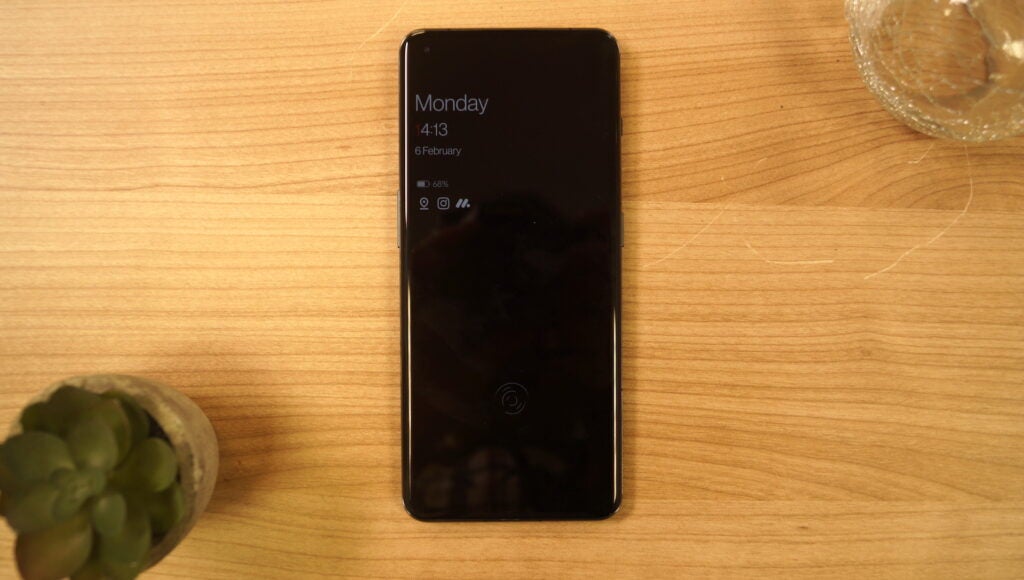
It supports 10-bit colour to complement the ability to take photos in 10-bit – more on that later – that essentially means it can display 1.07 billion colours, making for a vibrant experience with colours that are generally true to life. Animated shows like Archer and cartoon-style games like Survivor.io appear especially vibrant on the display of the OnePlus 11.
Dolby Vision HDR and HDR10+ support both sweeten the deal, with impressive dynamic range in supported titles when watching movies on the likes of Netflix. That maximum brightness also makes it easy to use in bright sunlight too.
The fingerprint scanner, embedded within the display, works as well as expected with near-instantaneous unlocking capabilities.
Cameras
- Capable triple camera rear setup
- Marked improvement in low-light photography
- Selfie camera is rather basic in comparison
OnePlus cameras have always been fine, but there are usually one of two little niggles that stop them from being the best camera phones around – even with the company’s partnership with camera powerhouse Hasselblad in more recent generations.
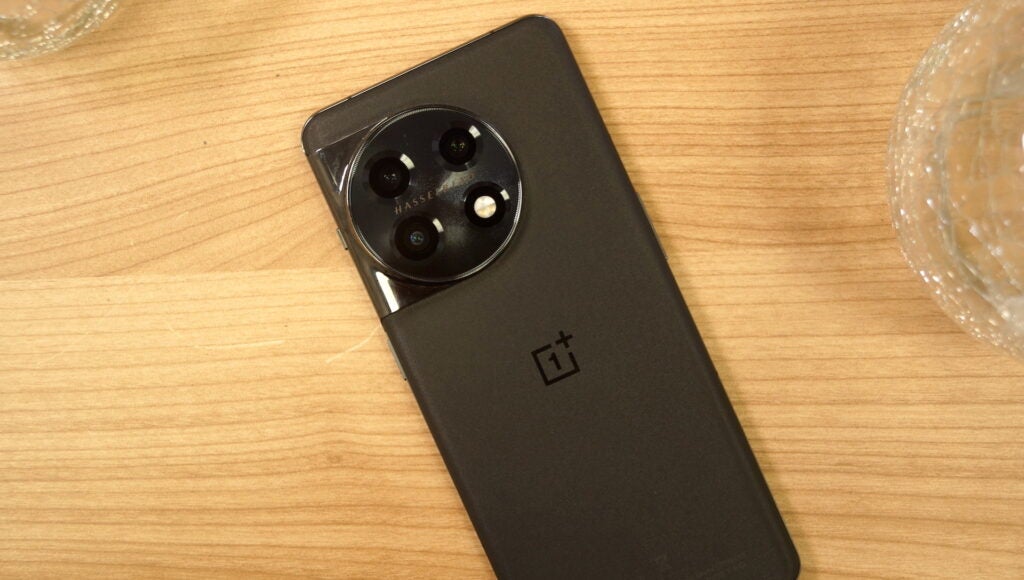
However, that has changed with the OnePlus 11, which I think offers a capable trio of cameras that can handle a variety of scenes.
The main 50MP camera boasts a fairly large 1/1.56in sensor and wide f/1.8 aperture that, along with features like OIS, allow it to take in much more light than previous OnePlus smartphones. That provides improvements in general photography, but a true jump forward in low-light photography.
While it won’t quite compete with the 200MP snapper of the Samsung Galaxy S23 Ultra, it’s still an impressively capable camera in low-light conditions without the need for a tripod. Even in scenarios with very little light, like the below shot of my garden with the only visible light being a lamp from my living room shining through the window, the OnePlus 11 captures plenty of light and detail – more so than I could see with the naked eye.

There are arguments that this is can be a little too much and some photographers would prefer to dial in the amount of light captured by the smartphone, it certainly comes in handy when taking selfies and group shots in pubs and other low-light areas.
The only issue is that, in challenging low-light conditions, the phone may have difficulty focusing, resulting in soft low-light images.
That performance extends to general photography, with the phone’s ability to capture in 10-bit colour allowing for impressive colour reproduction, capturing images true to life much of the time. There were certain scenarios in testing where the colours weren’t quite as accurate as what I was seeing, particularly with the below vibrant sunset, but that can be fixed with a quick edit.
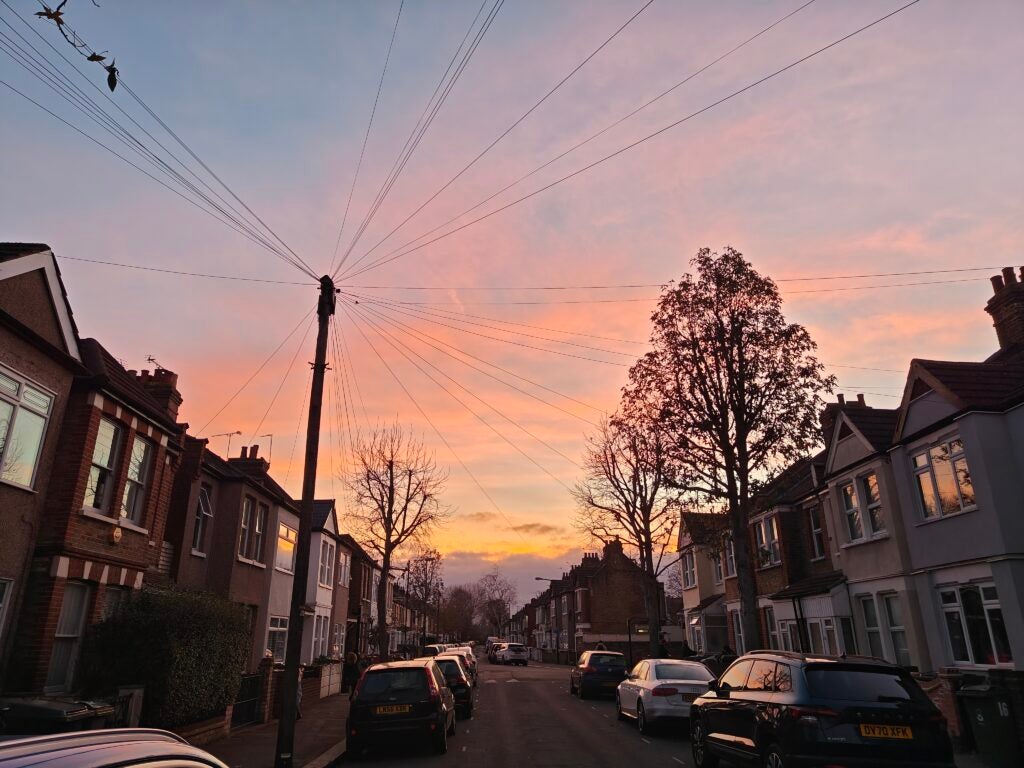
HDR performance is notable too, with the main camera able to capture the foreground of images with decent quality despite bright backlighting. Take a look at the below shot of my dog Luna with the bright sunset in the background. Just a few camera generations ago, that would’ve been nearly impossible to take on a smartphone.
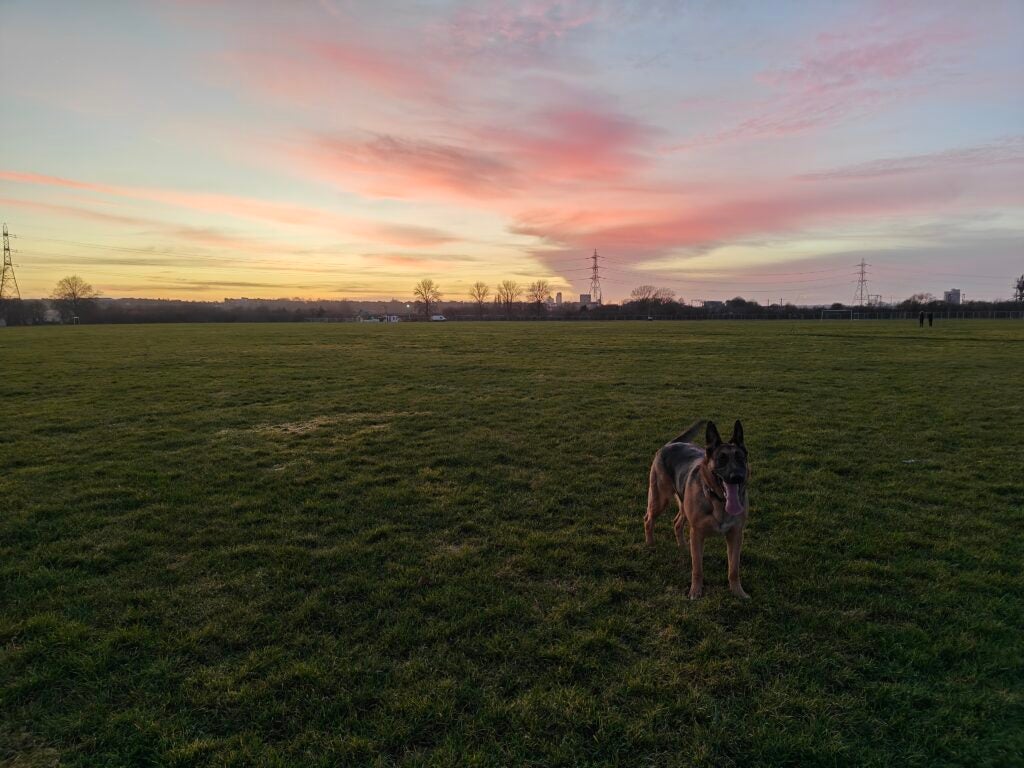
Generally, the main camera is capable and will likely be the one you use most of the time, but there’s also a 48MP 115-degree ultra-wide and 32MP 2x telephoto lens.

While the megapixel count isn’t always an indicator of overall quality, the ultra-wide and telephoto lenses deliver great performance, complete with HDR support, giving you a true alternative to the main lens that doesn’t compromise on quality or lighting. That’s particularly true of the telephoto lens, up from a paltry 8MP on the previous flagship.

Of course, the main lens will take the best images of the three, but I wasn’t disappointed by the performance of either lens in my two weeks of snapping away.
Camera tuning between the three lenses is also largely impressive, with very little difference in overall quality and colour profile that makes it difficult to see which lens was used at a glance – aside from the actual angle, of course – thanks largely to Hasselblad’s Natural Colour Calibration tech.
Video is up to a whopping 8K@24fps, though with such an aggressive crop applied at 8K, most people will be better off at 4K@60fps. The angles are wider and the OIS kicks in to provide a smooth shot, even if you’re walking.
There is an AI-powered video mode that’ll boost low-light performance and other factors to really make the videos pop, but limitations including 30fps capture and the ability to only use the main lens mean that most people won’t use it that often. If it could bump performance to 60fps, I think it’d be much more popular.
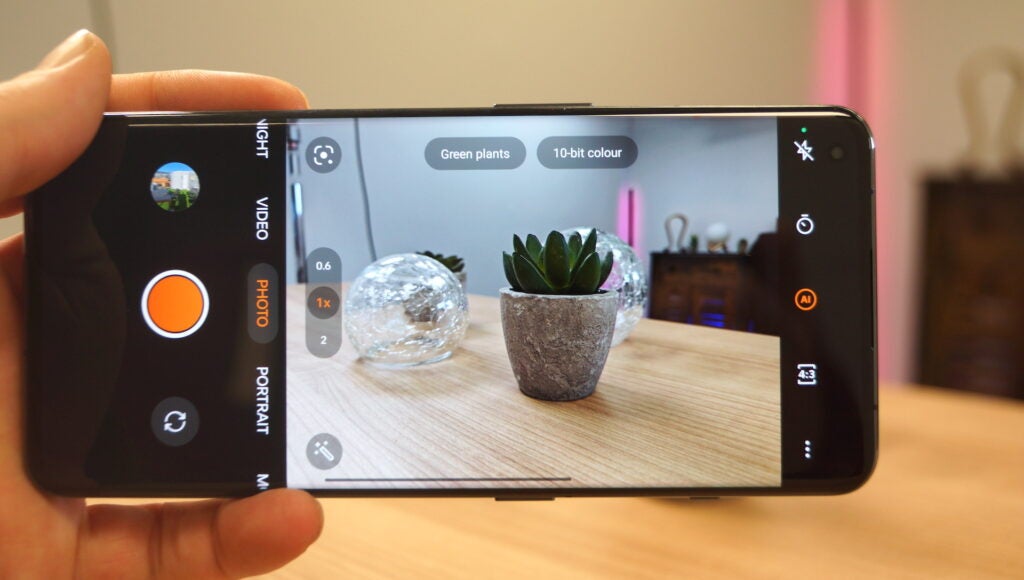
Flip the phone over and the 16MP selfie camera is exactly that; good for selfies. It’ll also more than suffice for video calls, though it caps out at 1080p and lacks advanced features like autofocus, meaning it’s not quite the ideal camera for video recording. Best leave that to the rear lenses…
Performance
- Flagship performance via Snapdragon 8 Gen 2
- OxygenOS is one of the best Android skins around
- Can get hot over extended gaming sessions
When it comes to the OnePlus 11 (and the past few OnePlus phones, to be honest) the software is a sensitive subject. That’s largely because OnePlus’ original OxygenOS has been co-opted by new owners Oppo and its ColorOS over the past few years, with fans calling it the Oppoficiation of OnePlus.
But, to me, that’s not really a bad thing; yes, the OG OxygenOS was nice, but the new Oxygen/ColorOS hybrid based on Android 13 provides one of the best Android experiences aside from the stock experience offered by Google.
It’s much more user-friendly and intuitive than other skins from Chinese manufacturers like Vivo’s FunTouchOS and Xiaomi’s MIUI with a high level of polish and some genuinely useful features not found in stock Android 13. Everything in the Settings menu is where you’d expect it to be, the always-on display offers support for apps like Spotify and there’s a high level of UI customisation.
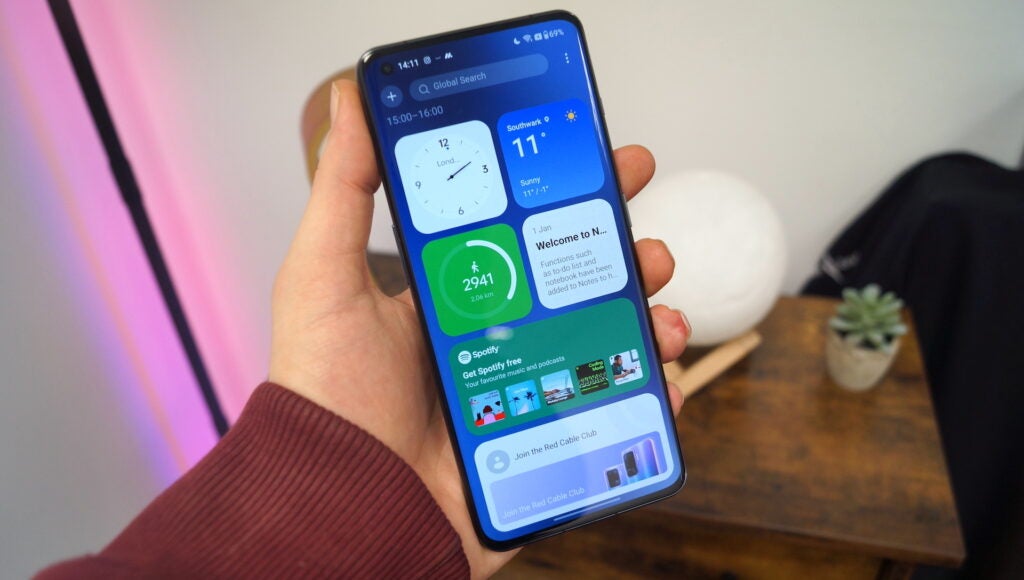
There are even unique features like Shelf, providing access to a range of widgets (step counter, music controls, to-do lists and more) with a swipe on the Home screen.
Combined with a four-year OS upgrade promise, I really do think the OnePlus software is among the best around, and if I could, I’d install it on most of the phones I review.
Software aside, general performance is snappy, with apps loading instantly and no sign of stutter or lag even when scrolling through media-heavy apps like Facebook and Twitter. However, that’s unsurprising given the phone packs Qualcomm’s top-end Snapdragon 8 Gen 2 chipset.
That’s largely backed up by my benchmark test results with a single-core score of 1165 and a multi-core score of 4856 in Geekbench 5 which pits it against top-tier competition like the Samsung Galaxy S23 Ultra despite its special ‘For Galaxy’ chipset. It’s a similar story in the GPU department, with a score of 3532 in the 3DMark Wild Life Extreme benchmark.
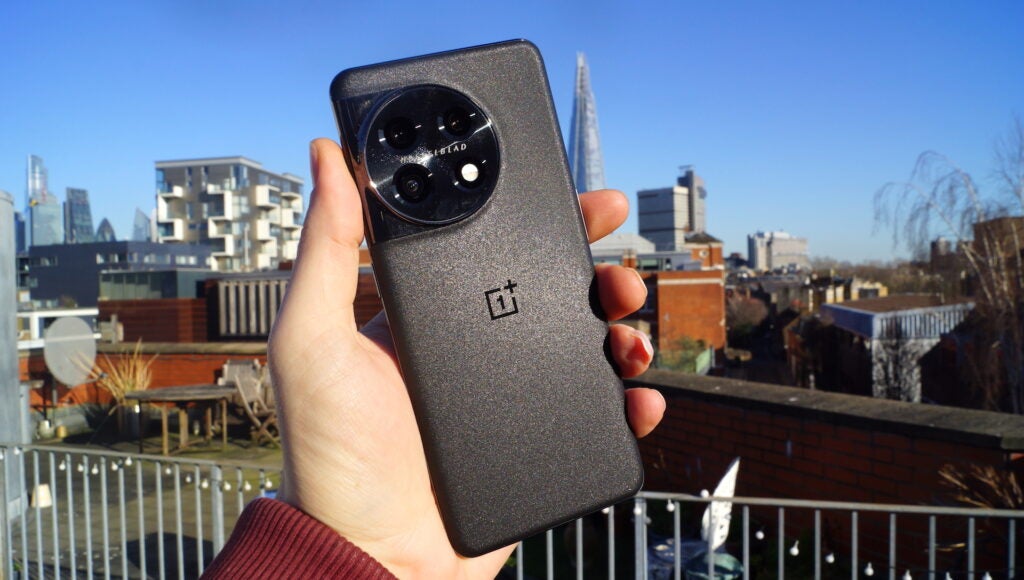
But while it’s certainly a capable smartphone, it’s not the best at keeping cool despite a new cooling system. I’ve noticed that it can get warm during extended gaming sessions when playing particularly demanding titles like Call of Duty Mobile.
While that’s not irregular among top-end flagships, the issue is that it’s the top and bottom edges – rather than the rear of the phone – that gets hot to the touch. AKA, the two places that sit in your palms as you play games in a horizontal aspect ratio.
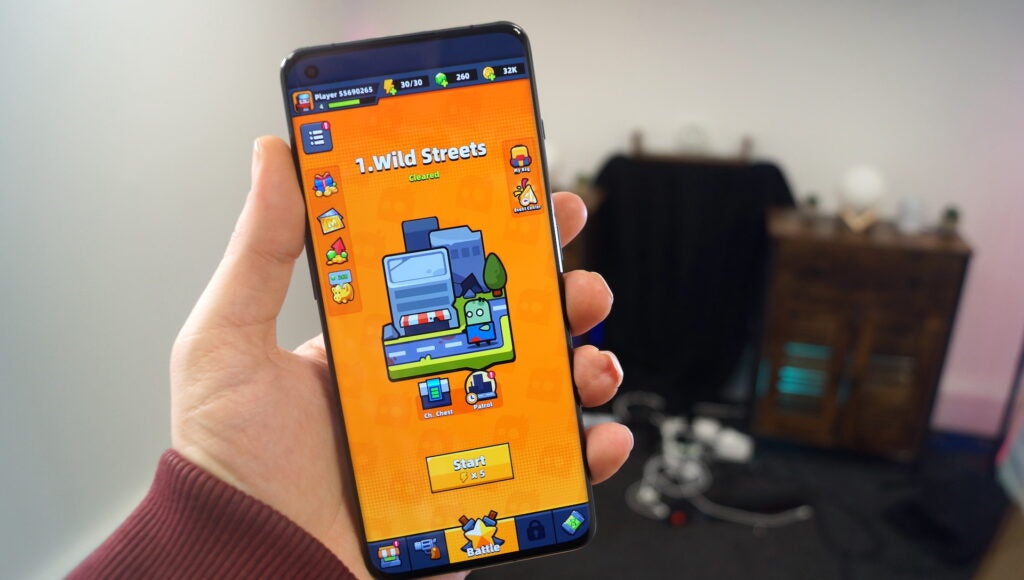
So yes, it’s capable, but it’s not exactly the most comfortable option for extended gameplay sessions. If that’s your thing, maybe invest in a gaming phone with active cooling.
As you’d expect from a flagship in 2023, the OnePlus 11 comes with a full selection of high-end connectivity options including support for 5G connectivity, Wi-Fi 6E, Bluetooth 5.3 and NFC for wireless payments. Sadly, there isn’t a headphone port, but outside of recent Xperia phones, that’s a rarity at the flagship level.
On the topic of audio, the OnePlus 11 provides a stereo speaker experience that’s ideal for watching YouTube videos and scrolling through TikTok, but as always, it’s not a replacement for a proper speaker to enjoy listening to your tunes. Dolby Atmos support does enhance the Bluetooth listening experience somewhat, but without a headphone jack, don’t expect high-res audio.

Battery life
- Comfortable all-day battery life
- Can squeeze 2 days from a single charge
- 0-100% charge in less than 30 minutes
Battery life is an area where the OnePlus 11 truly excels, with the 5000mAh battery having no problem delivering all-day battery life. I was comfortably able to get to the end of every day of testing with at least 30% battery remaining, and I never once hit the 20% low battery warning after almost two weeks of daily use.
I’m not exactly a power user, but I used the phone for messaging, calls, listening to music on my commute and taking plenty of photos for the review. I even played a few games, though granted it was usually fairly simple games like Survivor.io than AAA 3D titles like Genshin Impact.
That’s largely backed up by my battery benchmark tests too, with the OnePlus 11 draining by just 7% during a 30-minute gaming session and a nominal 6% when streaming on Netflix for an hour. It truly did relieve me of my battery anxiety, so much so that I even turned on battery-draining features like the always-on display without much worry.
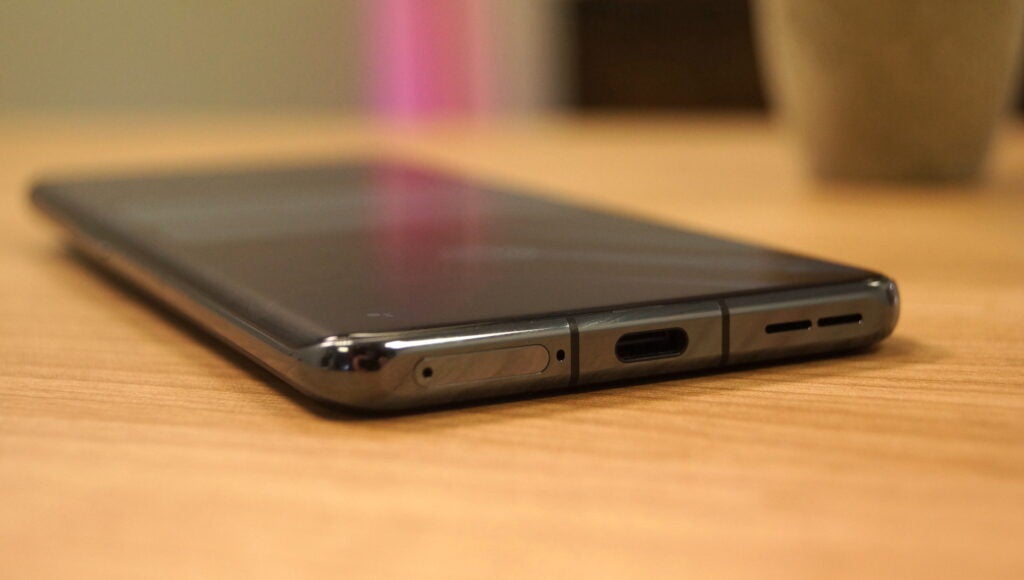
That’s paired with parent company Oppo’s SuperVOOC 100W charging tech that, in testing, achieved 50% charge in 12 minutes 37 seconds and a full charge in 27 minutes and 50 seconds. That’s super rapid, and it means you don’t need to leave your smartphone charging overnight, which should help the battery in the longer term.
For context, the Samsung Galaxy S23 Ultra with an identical 5000mAh battery but slower 45W charging takes close to 90 minutes to charge, and that phone costs well over £1000.
Usually, you have to choose between long battery life and fast charging, but that doesn’t really seem to be the case with the OnePlus 11.
Latest deals
Should you buy it?
You want a great all-rounder: The OnePlus 11 ticks most boxes, from great performance to a high-end display and capable cameras.
You prioritise wireless charging: The OnePlus 11 doesn’t include wireless charging, instead opting for 100W fast wired charging.
Final Thoughts
The OnePlus 11 is the first OnePlus smartphone I don’t really have any major complaints about; the design is great and easy to use one-handed, the display is at the top of its game both in terms of quality and built-in tech and, for the first time, there are no real complaints about the camera setup both in well-lit and low-light conditions.
Performance is also solid thanks to the Snapdragon 8 Gen 2 and, when combined with a 5000mAh battery and 100W charging tech, the phone lasts all day. When it does run flat, it can go from flat to full in less than half an hour. It’s also more affordable than the Samsung Galaxy S23 Plus and Galaxy S23 Ultra and likely many of the other best phones that will arrive this year.
Of course, there are minor niggles that may swing the vote either way – including the lack of wireless charging and a rather basic selfie camera – but for the most part, the OnePlus 11 ticks all the main boxes without being too expensive.
How we test
We test every mobile phone we review thoroughly. We use industry-standard tests to compare features properly and we use the phone as our main device over the review period. We’ll always tell you what we find and we never, ever, accept money to review a product.
Find out more about how we test in our ethics policy.
Used as a main phone for the review period
Thorough camera testing in well-lit and low-light conditions
Tested and benchnarked using respected industry tests
FAQs
Yes, after removing the Alert Slider with the OnePlus 10T, the Alert Slider is once again present on the OnePlus 11.
Sadly not. Much like previous models of OnePlus smartphone, the OnePlus 11 doesn’t offer support for wireless charging.
Trusted Reviews test data
Full specs
Jargon buster
mAh
An abbreviation for milliampere-hour and a way to express the capacity of batteries, especially smaller ones in phones. In most cases the higher the mAh, the longer the battery will last but this isn’t always the case.
5G
Offering faster download and upload speeds when compared to 4G. Great for game streaming and HDR video playback. Not supported everywhere yet and speeds vary wildly.
OLED and AMOLED
Types of displays that use self-lighting pixels to provide greater contrast and more vibrant colours than a typical LCD display, as well as sharper blacks.
Verdict
The OnePlus 11 looks to be a great all-rounder, hitting most criteria for what a flagship smartphone should offer. It looks great, boasts a gorgeous display, high-end performance, all-day battery life and, crucially, impressive camera chops with no immediate pitfalls. Sure, there are small omissions like wireless charging, but for the most part, the OnePlus 11 is a tempting option in the 2023 market.
Pros
- Stunning 6.7in AMOLED display
- Solid flagship performance
- Great rear camera performance
- All-day battery life
Cons
- No wireless charging
- Basic selfie camera setup
Availability
- UKRRP: £729
- USARRP: $699
- EuropeRRP: €849
- CanadaTBC
- AustraliaTBC
Key Features
-
Top-end displayThe 6.7in AMOLED display is one of the best around with a 120Hz refresh rate, support for Dolby Vision HDR and LTPO 3.0 technology. -
Capable rear-camera setupThe 50MP main camera is capable in both well-lit and low-light environments. The 48MP ultra-wide and 23MP telephoto lenses further improve the experience on offer. -
Top-end performanceWith Qualcomm’s Snapdragon 8 Gen 2 chipset, expect top-level performance no matter what you’re up to.
Introduction
After a China-focused launch in early January, the OnePlus 11 has had its worldwide debut.
The OnePlus 11 looks to fix some of the big complaints with last year’s smartphone offering with both improved camera performance compared to the OnePlus 10 Pro and the super-fast 100W charging exclusive to the OnePlus 10T last summer.
The question is, is it the 2023 flagship you should spend your hard-earned cash on? I’ve spent the last few weeks using the OnePlus 11 as my daily smartphone and I think the answer is a resounding yes.
Design and screen
- New circular camera housing on the rear
- Great build quality
- Top-end 6.7in AMOLED display with LTPO 3.0
The OnePlus 11 has undergone a bit of a facelift compared to its predecessor. It still retains the identity of a OnePlus smartphone, but has undergone refinements and enhancements.
It’s a well-built combination of aluminium and glass with a new stainless steel camera housing on the rear that looks a little bit like the Samsung Galaxy S22’s contoured camera housing, though this one is circular.

OnePlus says it’s inspired by a black hole and while that’s almost certainly marketing guff, the sparkly effect within the housing does look rather unique and eye-catching. It also helps that it matches the slight sparkle of the rest of the rear – as long as you opt for the black finish, that is. There’s also a more refrained green finish if you don’t like the eye-catching posterior of the black variant.
Long-time fans lamented the loss of the Alert Slider in last year’s OnePlus 10T as it was one of the key features of the OnePlus brand since the early days, giving users the ability to quickly set their phone to loud, vibrate or silent with the flip of a switch. But, true to OnePlus’ word, it’s back with the OnePlus 11, located on the top-left side of the phone.
It’s one of the most convenient features of any smartphone that gives you a way to visually check which sound mode the phone is on without having to wake the phone and access the notification shade. It’s a wonder that it’s only OnePlus and Apple that utilise the tech.

The 6.7-inch AMOLED display is one of the highlights of the phone, packing truly premium tech including a 2K resolution, 120Hz refresh rate and LTPO 3.0 tech that allows it to dynamically drop down to as little as 1Hz to save battery life when high refresh rates aren’t needed (like with the always-on display).
That’s a pretty important step as the always-on display is particularly useful, displaying not only notifications and the time but the ability to control music – as long as you use Spotify, that is – via the always-on display. The company suggests it can also display takeaway order updates, but this feature is not yet supported by any delivery apps in the UK.

It supports 10-bit colour to complement the ability to take photos in 10-bit – more on that later – that essentially means it can display 1.07 billion colours, making for a vibrant experience with colours that are generally true to life. Animated shows like Archer and cartoon-style games like Survivor.io appear especially vibrant on the display of the OnePlus 11.
Dolby Vision HDR and HDR10+ support both sweeten the deal, with impressive dynamic range in supported titles when watching movies on the likes of Netflix. That maximum brightness also makes it easy to use in bright sunlight too.
The fingerprint scanner, embedded within the display, works as well as expected with near-instantaneous unlocking capabilities.
Cameras
- Capable triple camera rear setup
- Marked improvement in low-light photography
- Selfie camera is rather basic in comparison
OnePlus cameras have always been fine, but there are usually one of two little niggles that stop them from being the best camera phones around – even with the company’s partnership with camera powerhouse Hasselblad in more recent generations.

However, that has changed with the OnePlus 11, which I think offers a capable trio of cameras that can handle a variety of scenes.
The main 50MP camera boasts a fairly large 1/1.56in sensor and wide f/1.8 aperture that, along with features like OIS, allow it to take in much more light than previous OnePlus smartphones. That provides improvements in general photography, but a true jump forward in low-light photography.
While it won’t quite compete with the 200MP snapper of the Samsung Galaxy S23 Ultra, it’s still an impressively capable camera in low-light conditions without the need for a tripod. Even in scenarios with very little light, like the below shot of my garden with the only visible light being a lamp from my living room shining through the window, the OnePlus 11 captures plenty of light and detail – more so than I could see with the naked eye.

There are arguments that this is can be a little too much and some photographers would prefer to dial in the amount of light captured by the smartphone, it certainly comes in handy when taking selfies and group shots in pubs and other low-light areas.
The only issue is that, in challenging low-light conditions, the phone may have difficulty focusing, resulting in soft low-light images.
That performance extends to general photography, with the phone’s ability to capture in 10-bit colour allowing for impressive colour reproduction, capturing images true to life much of the time. There were certain scenarios in testing where the colours weren’t quite as accurate as what I was seeing, particularly with the below vibrant sunset, but that can be fixed with a quick edit.

HDR performance is notable too, with the main camera able to capture the foreground of images with decent quality despite bright backlighting. Take a look at the below shot of my dog Luna with the bright sunset in the background. Just a few camera generations ago, that would’ve been nearly impossible to take on a smartphone.

Generally, the main camera is capable and will likely be the one you use most of the time, but there’s also a 48MP 115-degree ultra-wide and 32MP 2x telephoto lens.

While the megapixel count isn’t always an indicator of overall quality, the ultra-wide and telephoto lenses deliver great performance, complete with HDR support, giving you a true alternative to the main lens that doesn’t compromise on quality or lighting. That’s particularly true of the telephoto lens, up from a paltry 8MP on the previous flagship.

Of course, the main lens will take the best images of the three, but I wasn’t disappointed by the performance of either lens in my two weeks of snapping away.
Camera tuning between the three lenses is also largely impressive, with very little difference in overall quality and colour profile that makes it difficult to see which lens was used at a glance – aside from the actual angle, of course – thanks largely to Hasselblad’s Natural Colour Calibration tech.
Video is up to a whopping 8K@24fps, though with such an aggressive crop applied at 8K, most people will be better off at 4K@60fps. The angles are wider and the OIS kicks in to provide a smooth shot, even if you’re walking.
There is an AI-powered video mode that’ll boost low-light performance and other factors to really make the videos pop, but limitations including 30fps capture and the ability to only use the main lens mean that most people won’t use it that often. If it could bump performance to 60fps, I think it’d be much more popular.

Flip the phone over and the 16MP selfie camera is exactly that; good for selfies. It’ll also more than suffice for video calls, though it caps out at 1080p and lacks advanced features like autofocus, meaning it’s not quite the ideal camera for video recording. Best leave that to the rear lenses…
Performance
- Flagship performance via Snapdragon 8 Gen 2
- OxygenOS is one of the best Android skins around
- Can get hot over extended gaming sessions
When it comes to the OnePlus 11 (and the past few OnePlus phones, to be honest) the software is a sensitive subject. That’s largely because OnePlus’ original OxygenOS has been co-opted by new owners Oppo and its ColorOS over the past few years, with fans calling it the Oppoficiation of OnePlus.
But, to me, that’s not really a bad thing; yes, the OG OxygenOS was nice, but the new Oxygen/ColorOS hybrid based on Android 13 provides one of the best Android experiences aside from the stock experience offered by Google.
It’s much more user-friendly and intuitive than other skins from Chinese manufacturers like Vivo’s FunTouchOS and Xiaomi’s MIUI with a high level of polish and some genuinely useful features not found in stock Android 13. Everything in the Settings menu is where you’d expect it to be, the always-on display offers support for apps like Spotify and there’s a high level of UI customisation.

There are even unique features like Shelf, providing access to a range of widgets (step counter, music controls, to-do lists and more) with a swipe on the Home screen.
Combined with a four-year OS upgrade promise, I really do think the OnePlus software is among the best around, and if I could, I’d install it on most of the phones I review.
Software aside, general performance is snappy, with apps loading instantly and no sign of stutter or lag even when scrolling through media-heavy apps like Facebook and Twitter. However, that’s unsurprising given the phone packs Qualcomm’s top-end Snapdragon 8 Gen 2 chipset.
That’s largely backed up by my benchmark test results with a single-core score of 1165 and a multi-core score of 4856 in Geekbench 5 which pits it against top-tier competition like the Samsung Galaxy S23 Ultra despite its special ‘For Galaxy’ chipset. It’s a similar story in the GPU department, with a score of 3532 in the 3DMark Wild Life Extreme benchmark.

But while it’s certainly a capable smartphone, it’s not the best at keeping cool despite a new cooling system. I’ve noticed that it can get warm during extended gaming sessions when playing particularly demanding titles like Call of Duty Mobile.
While that’s not irregular among top-end flagships, the issue is that it’s the top and bottom edges – rather than the rear of the phone – that gets hot to the touch. AKA, the two places that sit in your palms as you play games in a horizontal aspect ratio.

So yes, it’s capable, but it’s not exactly the most comfortable option for extended gameplay sessions. If that’s your thing, maybe invest in a gaming phone with active cooling.
As you’d expect from a flagship in 2023, the OnePlus 11 comes with a full selection of high-end connectivity options including support for 5G connectivity, Wi-Fi 6E, Bluetooth 5.3 and NFC for wireless payments. Sadly, there isn’t a headphone port, but outside of recent Xperia phones, that’s a rarity at the flagship level.
On the topic of audio, the OnePlus 11 provides a stereo speaker experience that’s ideal for watching YouTube videos and scrolling through TikTok, but as always, it’s not a replacement for a proper speaker to enjoy listening to your tunes. Dolby Atmos support does enhance the Bluetooth listening experience somewhat, but without a headphone jack, don’t expect high-res audio.

Battery life
- Comfortable all-day battery life
- Can squeeze 2 days from a single charge
- 0-100% charge in less than 30 minutes
Battery life is an area where the OnePlus 11 truly excels, with the 5000mAh battery having no problem delivering all-day battery life. I was comfortably able to get to the end of every day of testing with at least 30% battery remaining, and I never once hit the 20% low battery warning after almost two weeks of daily use.
I’m not exactly a power user, but I used the phone for messaging, calls, listening to music on my commute and taking plenty of photos for the review. I even played a few games, though granted it was usually fairly simple games like Survivor.io than AAA 3D titles like Genshin Impact.
That’s largely backed up by my battery benchmark tests too, with the OnePlus 11 draining by just 7% during a 30-minute gaming session and a nominal 6% when streaming on Netflix for an hour. It truly did relieve me of my battery anxiety, so much so that I even turned on battery-draining features like the always-on display without much worry.

That’s paired with parent company Oppo’s SuperVOOC 100W charging tech that, in testing, achieved 50% charge in 12 minutes 37 seconds and a full charge in 27 minutes and 50 seconds. That’s super rapid, and it means you don’t need to leave your smartphone charging overnight, which should help the battery in the longer term.
For context, the Samsung Galaxy S23 Ultra with an identical 5000mAh battery but slower 45W charging takes close to 90 minutes to charge, and that phone costs well over £1000.
Usually, you have to choose between long battery life and fast charging, but that doesn’t really seem to be the case with the OnePlus 11.
Latest deals
Should you buy it?
You want a great all-rounder: The OnePlus 11 ticks most boxes, from great performance to a high-end display and capable cameras.
You prioritise wireless charging: The OnePlus 11 doesn’t include wireless charging, instead opting for 100W fast wired charging.
Final Thoughts
The OnePlus 11 is the first OnePlus smartphone I don’t really have any major complaints about; the design is great and easy to use one-handed, the display is at the top of its game both in terms of quality and built-in tech and, for the first time, there are no real complaints about the camera setup both in well-lit and low-light conditions.
Performance is also solid thanks to the Snapdragon 8 Gen 2 and, when combined with a 5000mAh battery and 100W charging tech, the phone lasts all day. When it does run flat, it can go from flat to full in less than half an hour. It’s also more affordable than the Samsung Galaxy S23 Plus and Galaxy S23 Ultra and likely many of the other best phones that will arrive this year.
Of course, there are minor niggles that may swing the vote either way – including the lack of wireless charging and a rather basic selfie camera – but for the most part, the OnePlus 11 ticks all the main boxes without being too expensive.
How we test
We test every mobile phone we review thoroughly. We use industry-standard tests to compare features properly and we use the phone as our main device over the review period. We’ll always tell you what we find and we never, ever, accept money to review a product.
Find out more about how we test in our ethics policy.
Used as a main phone for the review period
Thorough camera testing in well-lit and low-light conditions
Tested and benchnarked using respected industry tests
FAQs
Yes, after removing the Alert Slider with the OnePlus 10T, the Alert Slider is once again present on the OnePlus 11.
Sadly not. Much like previous models of OnePlus smartphone, the OnePlus 11 doesn’t offer support for wireless charging.
Trusted Reviews test data
Full specs
Jargon buster
mAh
An abbreviation for milliampere-hour and a way to express the capacity of batteries, especially smaller ones in phones. In most cases the higher the mAh, the longer the battery will last but this isn’t always the case.
5G
Offering faster download and upload speeds when compared to 4G. Great for game streaming and HDR video playback. Not supported everywhere yet and speeds vary wildly.
OLED and AMOLED
Types of displays that use self-lighting pixels to provide greater contrast and more vibrant colours than a typical LCD display, as well as sharper blacks.


















